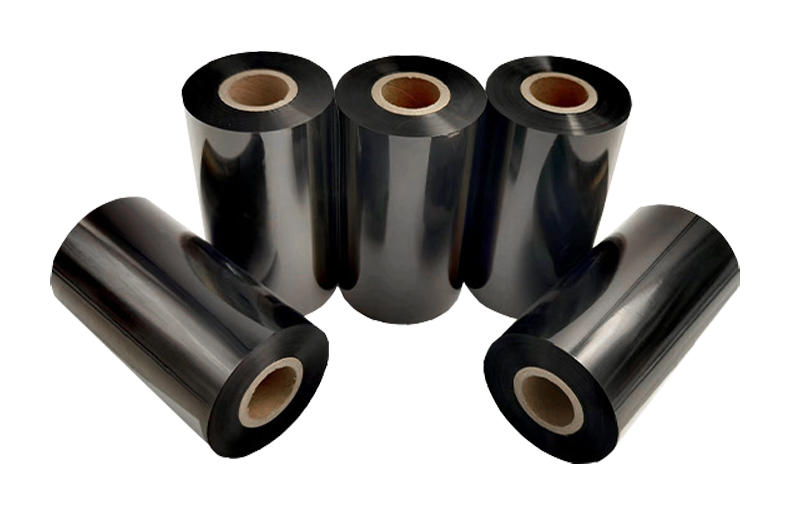
Can carbon ribbons be reused?
Carbon ribbon is a consumable used in printing and photocopying machines, which can be used to print text and images on paper. Its working principle is that during the printing process, the needles on the print head will print text and images onto the carbon ribbon according to the specified encoding method, and then transfer them to the paper through the carbon powder on the carbon ribbon to achieve the printing effect.
Generally speaking, carbon ribbons are disposable and are not recommended for repeated use, as it can gradually reduce the amount of carbon powder on the ribbon, affecting the blackness and clarity of printing, and increasing the risk of print head wear and ribbon damage. Therefore, it is recommended to replace the carbon ribbon with a new one in a timely manner when its lifespan expires or when there are quality issues.

What carbon tape is effective for printing copperplate paper labels?
Copperplate paper is one of the most common types of printing label paper. Copperplate paper is cost-effective for other label materials and is widely used in various fields such as shopping malls, inventory management, clothing labeling, and industrial production automation lines.
Usually, we use wax based carbon tape to print labels on copperplate paper. Compared to film labels, the surface of copperplate paper coating is rough, and ordinary wax based carbon tape can be used to print clear handwriting patterns and save costs.
However, in special circumstances where a certain degree of scratch and wear resistance is required while ensuring clear printing results, enhanced wax based carbon ribbons or tree wax mixed carbon ribbons with better scratch resistance should be used.
For example, in the outer box labels of warehouse goods, if there is some friction between two boxes or scratching between loading and unloading goods, it is possible to consider using mixed carbon tape to print labels.
What is the difference between ribbon and carbon ribbon?
Carbon ribbon is a specialized consumable for barcode printers, which is covered with a layer of carbon powder. During printing, the hot carbon powder is transferred from the printed head to the adhesive label. This process is called thermal transfer printing, also known as carbon ribbon or thermal transfer ribbon, and is suitable for barcode printers. Carbon ribbon is a high-tech professional coating material, and its quality is not only related to the quality of printers, including clarity, adhesion, and durability, but also closely related to the service life of equipment, especially expensive print heads. According to different material compositions, carbon ribbons can be divided into wax based carbon ribbons, resin based carbon ribbons, and mixed based carbon ribbons.
Ribbon is also a type of printing consumable. From the earliest mechanical impact type English printers to later computer needle printers, ribbon was used. The working principle of the ribbon is to use the dot matrix collision needle inside the head of the needle printer or the letter collision piece in the English typewriter to collide with the printing ribbon, producing a printing effect on the printing paper.
The composition of the ribbon is very simple, which is made by weaving nylon thread as the raw material and soaking and dyeing it with ink. A good ribbon should have a durable base, high elasticity, and be able to print for a long time without pilling, continuous stitching, or loose edges. Its performance is mainly characterized by a flat surface with no protruding fiber knots, uniform and tight warp and weft density organization, straight and uniform cutting edges, and no burning phenomenon. Touched by hand: The base is soft and delicate, with a smooth feeling. Good elasticity and recovery when pulled. Poor quality ribbon base has severe wire breakage and pulling, feels hard when touched, uneven cutting edges, severe edge burning, low elasticity when pulled, poor recovery, often gets stuck during printing, and is prone to lotus leaf edges, leading to needle blockage, tape jamming, and other phenomena.
Choose carbon ribbon printing labels or thermal printing labels?
Carbon ribbon printing is the process of printing content onto labels using carbon ribbon. The advantage is that it is waterproof, scratch resistant, and the handwriting is very clear. However, the cost of printing labels with carbon tape is relatively high. Secondly, due to the need for carbon ribbon printing, its printing speed is relatively slow.
Thermal printing is the process of printing content onto labels through heating. The advantages are low cost, fast printing speed, and very clear handwriting. However, thermal printed labels have poor waterproof performance and are easily affected by humid environments. Secondly, its scratch resistance is not as good as carbon tape printed labels.
So, which type of printing label should I choose? Actually, it mainly depends on your needs. If you need to keep labels for a long time or place them in a humid environment, carbon tape printing labels are more suitable for you. If you need to print a large number of labels quickly or only need to keep them for a short period of time, thermal printing labels are more suitable for you.
We offer comprehensive technical support, including free professional labeling solutions, advice on label materials and adhesive selection, as well as online/offline assistance from professional software and hardware engineers. Service email: andy@ownlikes.cn. In pre-sales, we leverage our extensive experience in specialty labeling projects to provide clients with the most suitable hardware solutions. Additionally, all our label barcode printers and scanners come with a three-year free warranty, demonstrating our confidence in our products.




